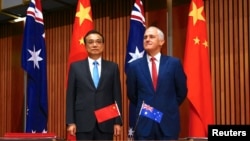Australia is hoping to ratify an extradition treaty with China, but this week abandoning plans for parliament to approve the controversial measure. Critics have insisted that China’s judicial system is fraught with human rights abuses.
The center-right Australian government abruptly withdrew plans to ratify the extradition treaty with Beijing when ministers realized it was facing defeat in parliament.
There was dissent from the opposition Labor party, and also within government ranks by MPs worried about the lack of safeguards within the agreement to offer protection to Australians deported to China.
Their concerns have echoed those of the Law Council of Australia, which said China did “not act in accordance with procedural fairness and rule of law standards in criminal proceedings.”
Matt Thistlethwaite, a Labor MP, says the agreement goes against key Australian principles.
“Australia values democracy, we value freedom of speech, we value the right to a fair trial, we value the presumption of innocence and we do not like the censorship of peoples’ comments in the media,” he said.
The government insists the accord would be an important part in Canberra’s law enforcement relationship with China, which is Australia’s biggest trading partner.
But despite opposition in parliament, Australian Foreign Minister Julie Bishop says she will continue to negotiate with MPs to ensure the extradition treaty is brought into force.
“The whole idea of foreign policy is to engage with other countries on the basis of trust, and we signed an agreement with China and there would be an expectation that having signed a treaty we would ratify it,” she said. “So that is what I am seeking to do now, to find a way that we can honor the agreement that we made.”
Australia has extradition treaties with about 40 other countries.
Experts say Australia’s decision to delay ratifying the extradition treaty would not go down well in Beijing, but that China’s displeasure would not inflict lasting damage on broader bilateral relations.




